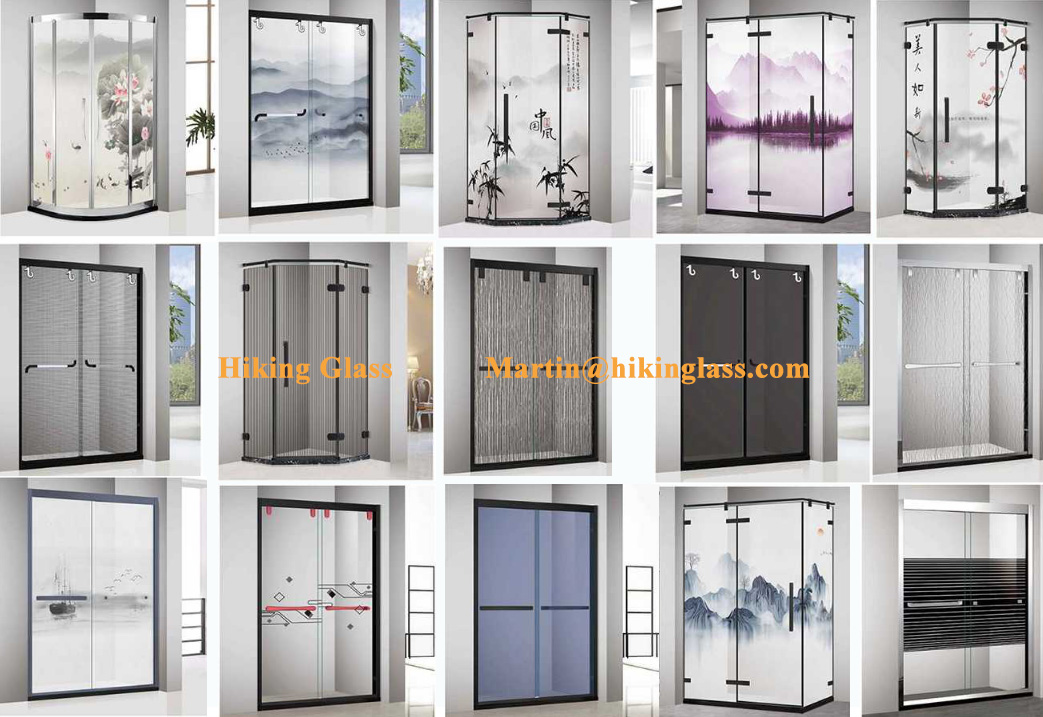Types of Shower Doors: A Comprehensive Guide
Shower doors are an essential component of modern bathrooms, contributing significantly to both functionality and aesthetics. Selecting the right type of shower door can transform your bathroom into a luxurious retreat, enhancing your showering experience. This comprehensive guide will explore various types of shower doors, detailing their features, benefits, and considerations to help you make an informed choice for your bathroom.

frameless shower doors are a popular choice in contemporary bathrooms due to their sleek, minimalist design. These doors are constructed from thick tempered glass, typically ranging from 3/8 to 1/2 inch in thickness, providing durability and stability without the need for metal framing.
Benefits:
Aesthetics: Frameless doors offer a clean, modern look that can make a bathroom appear more spacious and open.
Maintenance: With fewer metal parts, frameless doors are easier to clean and less prone to corrosion.
Customization: These doors can be custom-fitted to any shower space, accommodating unique dimensions and layouts.
Considerations:
Cost: Frameless shower doors tend to be more expensive due to the thicker glass and precise installation required.
Installation: Professional installation is recommended to ensure proper fit and sealing.
2. Framed Shower Doors
Framed shower doors are the traditional choice and feature a metal frame around the entire perimeter of the glass. The frame provides additional support, allowing for the use of thinner glass panels.
Benefits:
Affordability: Framed doors are generally more cost-effective than their frameless counterparts.
Sturdiness: The metal frame adds structural stability, making these doors durable and long-lasting.
Variety: Available in a wide range of styles, finishes, and configurations to match any bathroom decor.
Considerations:
Cleaning: The frame can collect water and soap scum, requiring more maintenance to keep clean.
Aesthetics: Framed doors may appear bulkier and can detract from a minimalist design aesthetic.
3. Semi-Frameless Shower Doors
Semi-frameless shower doors offer a compromise between the sleek look of frameless doors and the stability of framed doors. These doors typically have a frame around the perimeter but feature frameless glass panels on the sides and top.
Benefits:
Aesthetic Balance: Provides a modern look with some structural support, suitable for various bathroom styles.
Cost-Effective: Often less expensive than fully frameless doors while still offering a cleaner appearance than fully framed options.
Considerations:
Maintenance: Similar to frameless doors, semi-frameless doors are easier to clean than fully framed doors but still have some metal components that require attention.
Support: While offering some support, they may not be as structurally robust as fully framed doors.
sliding shower doors, also known as bypass doors, consist of two or more panels that slide past each other on tracks. These doors are ideal for bathrooms with limited space since they do not require additional clearance for opening.
Benefits:
Space-Saving: Perfect for small bathrooms where a swinging door would be impractical.
Accessibility: Easy to operate, making them a good choice for people with mobility issues.
Versatility: Available in both framed and frameless designs.
Considerations:
Track Maintenance: The tracks can accumulate dirt and require regular cleaning to ensure smooth operation.
Opening Size: The opening can be narrower compared to pivot or hinged doors, potentially limiting access.
Pivot Shower Doors, also known as swinging or hinged doors, open outward or inward like a regular door. These doors are attached to a pivot hinge on one side, allowing for a wide, unobstructed opening.
Benefits:
Accessibility: Provides a wider opening, making it easier to enter and exit the shower.
Design Flexibility: Suitable for both large and small shower enclosures, with options for frameless, semi-frameless, and framed designs.
Considerations:
Space Requirements: Requires sufficient clearance in the bathroom to open fully, which may not be suitable for smaller spaces.
Water Containment: Depending on the design, there can be a risk of water leakage if not properly sealed.
6. Bi-Fold Shower Doors
Bi-fold shower doors, also known as folding or accordion doors, consist of panels that fold in on themselves, creating a compact opening. These doors are ideal for small bathrooms where space is at a premium.
Benefits:
Compact Design: Takes up minimal space when opened, making it ideal for tight spaces.
Accessibility: Provides a wider opening compared to sliding doors, facilitating easier access.
Considerations:
Complex Mechanism: The folding mechanism can be more complex and may require more maintenance.
Aesthetics: May not offer the same sleek, modern look as frameless or semi-frameless options.
Curved shower doors are designed for corner shower enclosures, featuring a curved glass panel that follows the contour of the shower base. These doors add a unique aesthetic to the bathroom and can make efficient use of corner spaces.
Benefits:
Space Efficiency: Ideal for corner showers, maximizing the use of available space.
Elegant Design: Adds a touch of elegance and sophistication to the bathroom with its unique shape.
Considerations:
Cost: Custom shapes and sizes can be more expensive and may require professional installation.
Availability: Limited options compared to standard rectangular or square shower enclosures.
Conclusion
Choosing the right type of shower door involves considering factors such as bathroom size, design preferences, budget, and maintenance requirements. Each type of shower door offers distinct advantages and potential drawbacks, so it's essential to assess your specific needs and preferences before making a decision. Whether you opt for the minimalist elegance of frameless doors, the practicality of sliding doors, or the space-saving benefits of bi-fold doors, the right shower door can significantly enhance your bathroom's functionality and aesthetic appeal.
 English
English Russian
Russian




